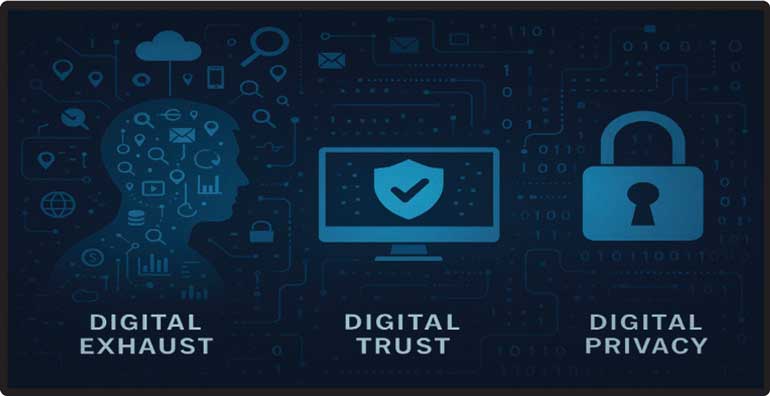Tuesday Feb 17, 2026
Tuesday Feb 17, 2026
Monday, 28 July 2025 01:23 - - {{hitsCtrl.values.hits}}

 Introduction
Introduction
In the modern digital ecosystem, every click, search, swipe, and share generate a hidden byproduct – digital exhaust. This byproduct, often unnoticed by users, forms the backbone of predictive algorithms, targeted advertising, and behavioural analytics. While the potential for innovation and personalisation is immense, it also raises critical concerns around digital trust and digital privacy. This article explores the intricate relationship between these three interconnected concepts and why understanding them is essential in the digital age.
What is digital exhaust?
Digital exhaust refers to the passive, often unintentional, data trails that individuals leave behind as they navigate the internet and use digital devices. This includes metadata, device usage patterns, location information, app logs, online behaviour, and much more.
Unlike active data input (like filling out a form), digital exhaust is collected in the background. For example:
This data, while not always personally identifiable on its own, can be aggregated and analysed to build detailed user profiles – often without the user’s informed consent.
Cookies and the knowledge gap: How digital exhaust is collected
One of the most common forms of digital exhaust comes from web cookies – small text files stored on a user’s device by websites. Understanding cookie categories and their implications is crucial to managing digital privacy:
Most websites today offer users a choice regarding cookies. Here’s what the options usually mean:
Many users accept cookies without understanding the privacy implications, contributing significantly to the volume and value of their digital exhaust. Educating users on cookie types and consent options is critical for empowering better control over personal data.
The role of digital trust
As digital exhaust becomes a valuable resource for businesses and governments alike, the need for digital trust becomes paramount. Digital trust refers to the confidence users have in digital systems to handle their data ethically, securely, and transparently.
Building digital trust depends on:
When organisations fail to uphold these principles, public trust erodes, leading to user disengagement, regulatory backlash, and reputational damage.
The battle for digital privacy
Digital privacy is the right of individuals to control how their personal information is collected and used. The exponential growth of digital exhaust challenges this right, as much of the data is collected without explicit user awareness.
Key concerns include:
Privacy regulations like the GDPR (EU) and CCPA (California) and Personal Data Protection Act, No. 9 of 2022 (PDPA) of Sri Lanka have taken steps toward protecting digital privacy, but enforcement gaps and global inconsistencies remain.
Interconnected challenges
The relationship between digital exhaust, trust, and privacy is deeply interwoven:
Technological advancements like AI and machine learning increase the capability to extract insights from digital exhaust, intensifying the stakes of privacy and trust management.
Path forward: Building an ethical digital future
To address these challenges, stakeholders including governments, businesses, and users must adopt a multi-pronged approach:
1. Design for privacy: Incorporate privacy by design in technology development.
2. Educate users: Promote digital literacy so users understand their data footprints.
3. Strengthen regulations: Ensure laws evolve with technology and are enforced consistently.
4. Innovate ethically: Businesses should prioritise long-term trust over short-term data exploitation.
Conclusion
As we continue to immerse ourselves in the digital world, our invisible trails -our digital exhaust will only grow. To protect our identities, autonomy, and freedom, we must place trust and privacy at the core of our digital interactions. The future of a truly human-centred digital society depends on how well we balance innovation with integrity.
(The writer is a Senior Chartered Accountant with over 20 years of experience, primarily in the banking sector, and is currently serving as AGM – Audit at one of the leading banks. He is also a CISA-certified auditor (ISACA) and a visiting lecturer at PIM, CA Sri Lanka, and IBSL.)